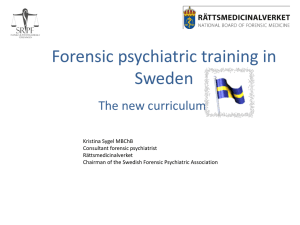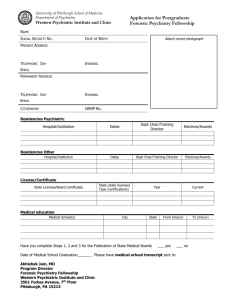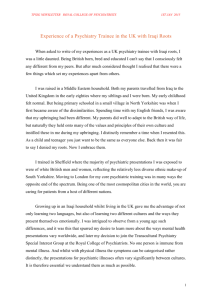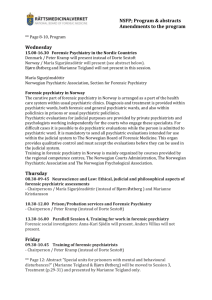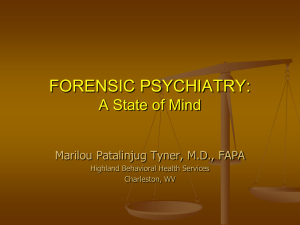92-310-1
advertisement
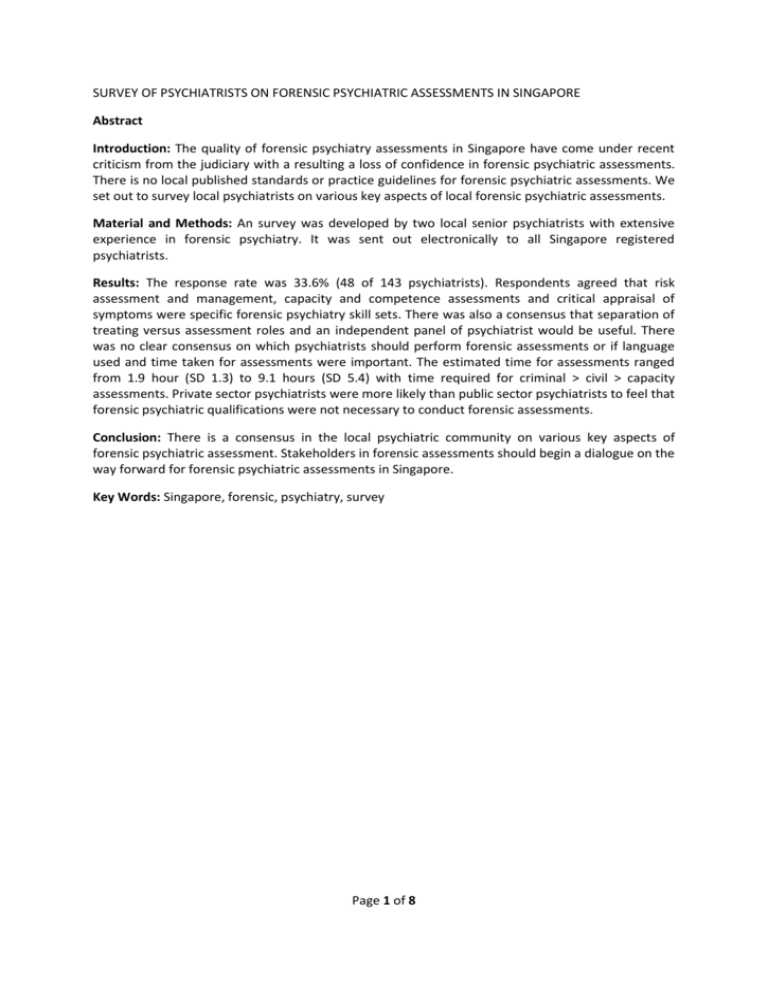
SURVEY OF PSYCHIATRISTS ON FORENSIC PSYCHIATRIC ASSESSMENTS IN SINGAPORE Abstract Introduction: The quality of forensic psychiatry assessments in Singapore have come under recent criticism from the judiciary with a resulting a loss of confidence in forensic psychiatric assessments. There is no local published standards or practice guidelines for forensic psychiatric assessments. We set out to survey local psychiatrists on various key aspects of local forensic psychiatric assessments. Material and Methods: An survey was developed by two local senior psychiatrists with extensive experience in forensic psychiatry. It was sent out electronically to all Singapore registered psychiatrists. Results: The response rate was 33.6% (48 of 143 psychiatrists). Respondents agreed that risk assessment and management, capacity and competence assessments and critical appraisal of symptoms were specific forensic psychiatry skill sets. There was also a consensus that separation of treating versus assessment roles and an independent panel of psychiatrist would be useful. There was no clear consensus on which psychiatrists should perform forensic assessments or if language used and time taken for assessments were important. The estimated time for assessments ranged from 1.9 hour (SD 1.3) to 9.1 hours (SD 5.4) with time required for criminal > civil > capacity assessments. Private sector psychiatrists were more likely than public sector psychiatrists to feel that forensic psychiatric qualifications were not necessary to conduct forensic assessments. Conclusion: There is a consensus in the local psychiatric community on various key aspects of forensic psychiatric assessment. Stakeholders in forensic assessments should begin a dialogue on the way forward for forensic psychiatric assessments in Singapore. Key Words: Singapore, forensic, psychiatry, survey Page 1 of 8 SURVEY OF PSYCHIATRISTS ON FORENSIC PSYCHIATRIC ASSESSMENTS IN SINGAPORE Introduction Forensic psychiatry is a psychiatric sub-speciality that deals with the interface between psychiatry and the law. This broadly includes clinical work with patients having psychiatric conditions in correctional settings and forensic psychiatric assessments for the courts or lawyers. Forensic psychiatric assessments in Singapore has come under attack in recent years from the judiciary1-3 for a lack of objectivity and thoroughness. In particular there were suggestions that public sector psychiatrists were more impartial compared to private sector psychiatrists2, and that the first language of the interviewee and duration of assessment were factors affecting the adequacy of the forensic psychiatric assessment3. Such criticisms of the practice of forensic psychiatry is an increasingly common situation internationally4 and what is happening in Singapore is a reflection of a larger worldwide trend5-9. While there are internationally published practice guidelines for certain forensic psychiatry assessments10, 11, they clearly state that they do "not present all acceptable current ways of performing forensic evaluations" and following such guidelines "does not lead to a guaranteed outcome". Singapore does not yet have local forensic psychiatry practice guidelines or standard of practice2. In the absence of local forensic psychiatry practice guidelines or standards, the Chapter of Psychiatrists under the Academy of Medicine set out to survey Singapore psychiatrists on their views of topical aspects of forensic psychiatry to determine local views on forensic psychiatry. Material and Methods Two senior psychiatrists with extensive forensic psychiatry experience developed a two page survey on forensic psychiatry that assessed the demographics and practice type of respondents and covered selected topics in forensic psychiatry. These topics include the skill sets in forensic psychiatry assessments, whom should be performing forensic psychiatry assessments, time taken for various forensic psychiatry assessments and how forensic psychiatry assessments (e.g. language used) should be performed. Open ended responses were allowed for each section. An electronic version of the survey was sent out to all Singapore Medical Council registered psychiatrists from Dec 2010 - Mar 2011. Multiple copies of the survey were sent out to increase response rates. Comparisons between sub-groups of psychiatrists were done with 2 tests. Results The response rate was 33.6% (48 of 143 psychiatrists). The average age of respondents was 47.8 years (SD 12.4) and 69% were male. 72.9% were in public practice and the average percentage of forensic work was 3.5% (SD 5.5). There was a clear consensus on the specific skill sets for forensic psychiatry with the vast majority of respondents indicating that risk assessment and management, capacity and competence assessments and critical appraisal of symptoms were specific forensic psychiatry skill sets. There was much less consensus on whom should be doing forensic psychiatry work. While most respondents felt that all psychiatrists should do forensic psychiatry work, a significant minority of respondents felt that only psychiatrists with forensic qualifications or psychiatrists in forensic psychiatry units should do forensic psychiatric work. There was a wide range in the estimated time required for various types of forensic psychiatric assessments, with durations in criminal (e.g. murder) > civil (e.g. damages for causing postPage 2 of 8 traumatic stress disorder) > capacity (e.g. wills) cases. The lowest estimated duration was 1.9 hours (SD 1.3) and highest 9.1 hours (SD 5.4). A slight majority of psychiatrists felt that the duration taken to complete a forensic psychiatry assessment was an important indicator of adequacy of assessment and that it was essential for the assessment to be conducted in the language that the person being assessed was most comfortable with. Most psychiatrists agreed that the role of treating clinician and forensic assessor should be separate and that it would be useful to have an independent panel of psychiatrists to assess cases where conflicting diagnosis have been made. The results were stratified according to the practice type (private versus public) and gender of the psychiatrists. It is noteworthy that there was only one statistically significant differences between private and public sector psychiatrist survey results. Private psychiatrists were more likely to feel that a psychiatrist did not need forensic qualifications to do forensic work (2 = 3.98, df=1, p=0.046). Interestingly female psychiatrists were more likely to be undecided if the duration of assessments was an important factor for adequacy of the assessment (2 = 11.70, df=2, p=0.003). See Table 1 for detailed results. Table 1. Results from survey of Singapore Psychiatrists on Forensic Psychiatry Demographics Age Male Public Practice Percentage of forensic psychiatry practice 47.8 years (SD 12.4) 69.0% 72.9% 3.5% (SD 5.5) Whom should be doing forensic psychiatry assessments All psychiatrists Only psychiatrists with forensic qualifications Only psychiatrists in a forensic unit 66.7% 29.2% 20.8% What are Forensic Psychiatry Skill Sets Risk Assessment and Management Capacity and Competence Assessments Critical Appraisal of Symptoms 83.3% 83.3% 79.2% Estimated Duration of Forensic Psychiatry Assessments Capacity (lower estimate) Capacity (higher estimate) Civil cases (lower estimate) Civil cases (higher estimate) Criminal (lower estimate) Criminal (higher estimate) 1.9 hours (SD 1.3) 4.7 hours (SD 2.6) 3.1 hours (SD 1.9) 7.2 hours (SD 3.9) 4.0 hours (SD 2.0) 9.1 hours (SD 5.4) Do you think the duration taken to complete forensic psychiatric assessments is an important factor when considering the adequacy of the assessment? Yes No Maybe 62.5% 20.8% 16.7% How important is it for the assessing psychiatrist to conduct the forensic psychiatric assessment in the first language of the person being assessed? Essential Good to have Not required 58.3% 39.6% 2.1% Page 3 of 8 Should the roles of treating clinician and forensic assessment be separate? Yes No Not sure 77.1% 12.5% 10.4% Do you think it would be useful to have an independent panel of psychiatrists (public and private) to assess cases where conflicting diagnosis have been made? Yes No Not sure 79.2% 10.4% 10.4% Discussion The main findings from the survey were that there was no clear difference in the opinions of private versus public sector psychiatrists on major aspects of forensic psychiatry (forensic psychiatry skill sets, duration for forensic psychiatry assessments, how the assessments should be done) and clear agreement on the separation of treating and assessment roles and the usefulness of an independent panel of psychiatrists in cases with conflicting diagnosis. The judiciary has opined that spending more time, having more sources of information and the use of the first language of the individual being assessed are important considerations3 for the adequacy of a forensic psychiatric assessment. These opinions have face validity and are consistent with generally agreed upon components of a good forensic psychiatric assessment12: Adherence to and documentation of ethical standards (e.g. clarification that the forensic psychiatric assessment was not a doctor-patient relationship), appropriate types and sources of data for a forensic psychiatric assessment, the selective use of standard psychological tests and forensic instruments, the collection and use of third party information and an explanation of the clinical facts and reasoning behind the psychiatrists opinion. However in our survey there was no clear consensus among psychiatrists in this survey on the relationship between duration or the language used in the forensic psychiatric assessment and its adequacy. There was also no clear agreement on which psychiatrists should be performing such assessments. Despite judiciary's opinions on the matter, there is no evidence that any of their suggestions improve the quality of forensic psychiatric assessment. The main reason for this is that there is no 'gold standard' or 'truth' about a defendant's competence to stand trial or insanity13, 14. Unlike in other areas of medicine where there are objective markers (e.g. histology for diagnosing cancer and radiographs for diagnosing fractures), in forensic psychiatry what we have are individual opinions on the matter. Critics have opined that psychiatrists would either end up deceiving either the legal system or the person being evaluated and ultimately may have little truth to offer to the courts in an adversarial system15. This pessimism has been countered with the 'Standard Position'16 which broadly consists of objective truth-telling (accurately reflecting the scientific data on the subject at hand and the consensus of the field) and respect for persons (avoidance of deception, exploitation and needless invasion of personal privacy). Proponents of the Standard Position believe that psychiatrists can offer reliable and valid testimony to the courts. This can be done by resisting an advocacy role using structured approaches to assessment that highlight inconsistencies17 and with continual medical training. Even for the relatively mundane issue of language used in assessments, current guidelines11 emphasize that the requirement is to ensure that the person being evaluated understands the concepts and knowledge areas being assessed and not the language used. Akin to the legal practice of using court interpreters, there is no evidence that forensic psychiatric assessments performed in the language the assessee is most comfortable with improves the quality of the forensic assessment. On the contrary, in the absence of a 'gold standard' it is Page 4 of 8 disingenuous to assume that any particular aspect of a forensic psychiatric assessment (e.g. language used, time spent etc) will make the assessment closer to a relative 'truth'. While it is unclear that 'more is better' in forensic psychiatry, what is clear is that if psychiatry were to adopt the judiciary's recommendations to simply spend more time on assessments, obtain more sources of information and use more translators, the resources required for forensic psychiatric assessments would increase dramatically. The implications of such an increase could include increased time required to completing forensic psychiatric assessments, delays in court proceedings, increased perceived disparities between resource limited public sector assessments and resource elastic private assessments and loss of public confidence in both the psychiatric and legal systems. It may be premature to conclude that 'more is better' in forensic psychiatry. At the heart of recent criticisms was the question: Why do psychiatrists appear to disagree so dramatically in court1-3? In part, the issue is that of biased reporting. While the newspapers give extensive coverage to disagreements between psychiatrists18, the evidence was that the agreement between psychiatrists was good irrespective of which adversarial side19, 20 they were on for serious crime. However there was less agreement between psychiatrists for anxiety spectrum disorders (e.g. post-traumatic stress disorder) and in civil cases there was better agreement between psychiatrists on the same adversarial side21 and if the plaintiff was involved in a fatal accident22. There will always be situations where medical experts disagree and in forensic psychiatry there are three broad explanations for that: The general limitations of psychiatry, the specific limitations of forensic psychiatry and bias. Psychiatric assessments rely mostly on the subjective reports from the patient and the ability to objectify the assessment is necessarily limited by this fact. Even while the diagnostic guidelines are being revised to include more objective neuroscience markers, there is a recognition that there is still not a single diagnostic test based on neuroscience that can be applied in clinical psychiatric practice23. That is not to say that there is poor reliability or validity in modern psychiatric classification systems. The field trials for both major modern psychiatric classifications systems (DSM and ICD) showed good reliability and validity24, 25 in the context of an empathetic doctor-patient relationship with a common therapeutic goal. While there is good reliability and validity when the psychiatric classification systems are properly used in this context, there is still considerable inconsistency in longitudinal psychiatric assessments26-29 . In contrast, the context of the forensic psychiatric assessment is that of a complex interplay of interests where the psychiatrist has a duty to the court rather than the person being assessed. In this setting an empathetic environment is necessarily limited by the ethical concern of not allowing the person being assessed to believe the relationship with the psychiatrist is a therapeutic one. Without this therapeutic relationship the reliability of information elicited in the forensic context is inferior30. Perhaps the best way of approaching this is for forensic psychiatry to stay squarely within the realm of psychiatry and to present descriptive information about the mental state of the person being assessed and not to stray into the 'ultimate issue' testimony31: that is the legal or moral questions of whether the person being assessed is criminally responsible or the 'but-for' proximate legal test that asks psychiatrists to speculate on hypothetical scenarios involving a hypothetical defendant. The goals of the legal system are disparate from the medical system. The former is concerned with culpability (in criminal cases) and liability / causation (in civil cases) while the latter is concerned with diagnosis and treatment. The standards of what is admissible in court32 or requirements for legal proceedings33 are necessarily different from a scientific medical article34 and just as "judges and lawyers should not play at being doctors"35, so should doctors not try to be judges. Page 5 of 8 With respects to bias of psychiatrists accounting for conflicting assessments, there is evidence that under certain circumstances (e.g. anxiety disorders19, 20 and civil cases21) the agreement between psychiatrists on the same adversarial side is higher than that for psychiatrists on opposing sides. Similarly under certain circumstances (e.g. fatal accidents involving the plaintiff22, child custody cases36 or in hindsight37) the assessments may reflect a bias based on sympathy or scepticism. In our own survey, there was very little difference in the opinions of public versus private sector psychiatrists. The only difference in opinion in the survey between private and public sector psychiatrists was that the former did not agree as much with the statement that psychiatrists needed forensic qualifications to perform forensic psychiatric work. This probably reflects the demand for forensic psychiatric assessments in the private sector and the reluctance of public sector psychiatrists to engage in forensic psychiatric work because of heavy workloads and lack of training. Despite this reassuring evidence, the fact remains that bias will always be a concern and the best approach towards this, and the limitations of forensic psychiatry, is what the judiciary has been practicing for many years: Group Decisions. In the absence of a "gold standard" for forensic psychiatric assessments, it is possible to have an accurate group consensus by having multiple independent assessments38, i.e. an independent peer review committee31. It is interesting to note that the Family Court has already implemented the concept of an independent panel of psychiatrists by the use of a court appointed psychiatrists for child custody cases since 2nd quarter 200839. This programme deliberately moved away from the traditional adversarial system to reduce the contest between opposing parties. This may be a step in the right direction for disputed cases with conflicting forensic psychiatric assessments in the interests of the involved parties. The survey is limited by the low response rate and relatively small absolute number of respondents. Thus some of the findings can only be viewed as preliminary. However despite this limitation there were robust signals for the type of specific skill sets for forensic psychiatry, the separation of treating and assessment roles and the usefulness of an independent panel in cases with conflicting psychiatric diagnosis. Conclusion In conclusion, our survey has shown that there is much consensus among psychiatrists in Singapore on the major aspects of forensic psychiatry assessment in Singapore and little evidence of bias based on the adversarial side of the psychiatrist. There is a strong consensus that the role of assessment and treatment should be separate and that an independent panel of peers would be useful to resolve differences in opinion. We recommend that the stakeholders of forensic psychiatric assessments in Singapore begin a dialogue on the way forward to improve forensic psychiatric assessments and its perception in Singapore to bolster public confidence in both psychiatry and the law. Page 6 of 8 REFERENCES 1. 2. 3. 4. 5. 6. 7. 8. 9. 10. 11. 12. 13. 14. 15. 16. 17. 18. 19. 20. 21. Leong, W.-K., Bus driver who killed step-daughter escapes death penalty, in The Straits Times. 8th Nov 2010, Singapore Press Holdings: Singapore. Spykerman, K., 'Psychiatrists, don't become hired guns', in The Straits Times. 10th October 2009 Singapore Press Holdings: Singapore. Lum, S., Man's mental state not fully investigated, in The Straits Times. 9th July 2010 Singapore Press Holdings: Singapore. Heilbrun, K., et al., Standards of practice and care in forensic mental health assessment: Legal, professional, and principles-based consideration. Psychology, Public Policy, and Law, 2008. 14(1): p. 1. Beck, M., The hired gun expert witness. Mo Med, 1994. 91(4): p. 179-82. Shea, P., Psychiatry in court. 1996, Sydney, Australia: Hawkins Press. Gutheil, T.G., M. Commons, and P.M. Miller, Withholding, seducing, and threatening: a pilot study of further attorney pressures on expert witnesses. J Am Acad Psychiatry Law, 2001. 29(3): p. 336-9. Greenberg, S.A. and D.W. Shuman, Irreconcilable conflict between therapeutic and forensic roles. Professional Psychology: Research and Practice, 1997. 28(1): p. 50. Groves, J.E., Taking care of the hateful patient. New England Journal of Medicine, 1978. 298(16): p. 883-887. Giorgi-Guarnieri, D., et al., AAPL practice guideline for forensic psychiatric evaluation of defendants raising the insanity defense. American Academy of Psychiatry and the Law. J Am Acad Psychiatry Law, 2002. 30(2 Suppl): p. S3-40. Mossman, D., et al., AAPL Practice Guideline for the forensic psychiatric evaluation of competence to stand trial. J Am Acad Psychiatry Law, 2007. 35(4 Suppl): p. S3-72. Nicholson, R.A. and S. Norwood, The quality of forensic psychological assessments, reports, and testimony: Acknowledging the gap between promise and practice. Law and Human Behavior, 2000. 24(1): p. 9-44. Cooper, V.G. and P.A. Zapf, Predictor variables in competency to stand trial decisions. Law and Human Behavior, 2003. 27(4): p. 423-436. Mankad, M., S. Brakel, and R. Wilson, Commentary: Incorporation of competence instruments into clinical practice. Journal of the American Academy of Psychiatry and the Law Online, 2002. 30(4): p. 483. Stone, A.A., The ethical boundaries of forensic psychiatry: A view from the ivory tower. Bulletin of the American Academy of Psychiatry & the Law, 1984. Appelbaum, P.S., Ethics and forensic psychiatry: translating principles into practice. Journal of the American Academy of Psychiatry and the Law Online, 2008. 36(2): p. 195. Calcedo-Barba, A., Objectivity and ethics in forensic psychiatry. Curr Opin Psychiatry, 2010. 23(5): p. 447-52. Morbid jealousy? Doc's boss disagrees, in Straits Times. 22nd Nov 2005, Singapore Press Holdings: Singapore. Nielssen, O., G. Elliott, and M. Large, The reliability of evidence about psychiatric diagnosis after serious crime: Part I. Agreement between experts. J Am Acad Psychiatry Law, 2010. 38(4): p. 516-23. Large, M., O. Nielssen, and G. Elliott, The reliability of evidence about psychiatric diagnosis after serious crime: part II. Agreement between experts and treating practitioners. J Am Acad Psychiatry Law, 2010. 38(4): p. 524-30. Large, M. and O. Nielssen, An audit of medico legal reports prepared for claims of psychiatric injury following motor vehicle accidents. Australian and New Zealand journal of psychiatry, 2001. 35(4): p. 535-540. Page 7 of 8 22. 23. 24. 25. 26. 27. 28. 29. 30. 31. 32. 33. 34. 35. 36. 37. 38. 39. Large, M.M. and O. Nielssen, Factors associated with agreement between experts in evidence about psychiatric injury. J Am Acad Psychiatry Law, 2008. 36(4): p. 515-21. Frances, A., A warning sign on the road to DSM-V: beware of its unintended consequences. Psychiatric Times, 2009. 26(8): p. 1-9. Spitzer, R.L., J.B. Forman, and J. Nee, DSM-III field trials: I. Initial interrater diagnostic reliability. American Journal of Psychiatry, 1979. 136(6): p. 815. Sartorius, N., et al., Progress toward achieving a common language in psychiatry: Results from the field trial of the clinical guidelines accompanying the WHO classification of mental and behavioral disorders in ICD-10. Archives of general psychiatry, 1993. 50(2): p. 115. Baca-Garcia, E., et al., Diagnostic stability of psychiatric disorders in clinical practice. The British Journal of Psychiatry, 2007. 190(3): p. 210. Melartin, T.K., et al., Categorical and dimensional stability of comorbid personality disorder symptoms in DSM-IV major depressive disorder: a prospective study. The Journal of clinical psychiatry, 2010. 71(3): p. 287. Ruggero, C.J., et al., Ten-year diagnostic consistency of bipolar disorder in a first-admission sample. Bipolar Disord, 2010. 12(1): p. 21-31. Vollebergh, W.A.M., et al., The structure and stability of common mental disorders: the NEMESIS study. Archives of general psychiatry, 2001. 58(6): p. 597. Calcedo-Barba, A., Objectivity and ethics in forensic psychiatry. Current Opinion in Psychiatry, 2010. 23(5): p. 447. Appelbaum, P.S., Ethics and forensic psychiatry: translating principles into practice. J Am Acad Psychiatry Law, 2008. 36(2): p. 195-200. Gold, J.A., et al., Daubert v Merrell Dow. JAMA: the journal of the American Medical Association, 1993. 270(24): p. 2964. Roesch, R. and K. McLachlan, Competency to stand trial. Corsini Encyclopedia of Psychology, 1987. Guyatt, G., et al., Evidence-based medicine. JAMA: the journal of the American Medical Association, 1992. 268(17): p. 2420. Chao Hick Tin JA, T.L.M.J., Yong Pung How CJ. Dr Khoo James and Another v Gunapathy d/o Muniandy and another appeal. 2002; Available from: http://www.singaporelaw.sg/rss/judg/8318.html. Everson, M.D. and J.M. Sandoval, Forensic child sexual abuse evaluations: assessing subjectivity and bias in professional judgements. Child Abuse Negl, 2011. 35(4): p. 287-98. LeBourgeois III, H., et al., Hindsight bias among psychiatrists. Journal of the American Academy of Psychiatry and the Law Online, 2007. 35(1): p. 67. Mossman, D., et al., Quantifying the Accuracy of Forensic Examiners in the Absence of a “Gold Standard”. Law and Human Behavior, 2010. 34(5): p. 402-417. The Subordinate Courts of Singapore. The CHILD Programme. 2008 15th Oct 2010 [cited 2011 17th July]; Available from: http://app.subcourts.gov.sg/family/page.aspx?pageid=45944. Page 8 of 8

